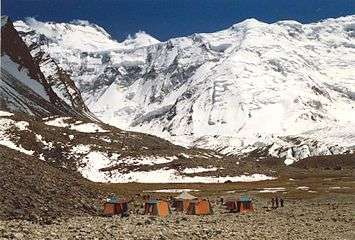Pamir National Park
| Tajik National Park (Mountains of the Pamirs) | |
|---|---|
| Name as inscribed on the World Heritage List | |
 | |
| Type | Natural |
| Criteria | (vii)(viii) |
| Reference | 1252 |
| Inscription history | |
| Inscription | 2013 (37th Session) |
The Pamir National Park (also known as Pamersky, Pamirsky or Tajik National Park) is a national park and nature reserve in eastern Tajikistan. It was established in 1992. In 1989-1992, Anvar J. Buzurukov (as the head of the Protected Areas Department of the Ministry of the Environment) initiated, planned and led scientific feasibility studies and the international scientific camp "Pamir-90" towards establishing the first national and natural parks in the Tajik SSR, the biggest mountain park in USSR.
The park was designated by Decision No. 267 of the Tajikistan Government on July, 20, 1992. It was the biggest high mountain park in USSR, with a total area of 1.2 million hectares, a year before the same team established the first nature reserve in Tajikistan, the Shirkent Nature Park. The park is now called the Tajik National Park. It stretches about 2,6 mill.ha which is 18% of the total size of Tajikistan. It includes parts of the Pamir Mountains .In 2001 its area was increased to 2.6 million hectares by the Order of the Government of the Republic of Tajikistan No. 253.
Ecology and wildlife
The national park features a mix of steppe, desert, grassland and alpine regions. It has long cold winters and cool summers, with an average annual rainfall of 12.7 cm.[1]
Species known to live in the national park include the brown bear, snow leopard, wolves, markhor, Marco Polo sheep, brown-headed gulls and bar-headed geese.[2]
World Heritage Status
In 2008, the national park was submitted to UNESCO with a view to becoming a World Heritage Site. In 2013, the park was accepted as World Heritage.[3]

 Map of eastern Tajikistan and the Pamir Ranges, showing the Pamir National Park outlined in green
Map of eastern Tajikistan and the Pamir Ranges, showing the Pamir National Park outlined in green
http://whc.unesco.org/en/list/1252/
References
- ↑ "Pamir" The Columbia Electronic Encyclopedia, 6th ed.
- ↑ "Pamir alpine desert and tundra". Terrestrial Ecoregions. World Wildlife Fund.
- ↑ (English) Mount Etna and the Mountains of Pamir inscribed on World Heritage List alongside El Pinacate and Gran Desierto de Altar, whc.unesco.org, 21 june 2013.
Coordinates: 39°N 72°E / 39°N 72°E